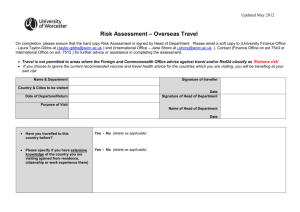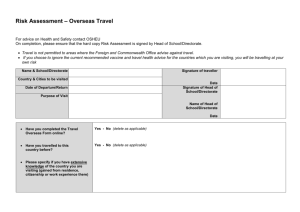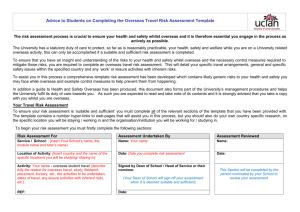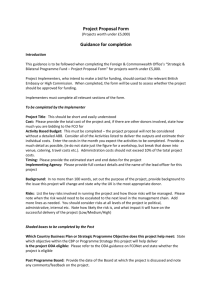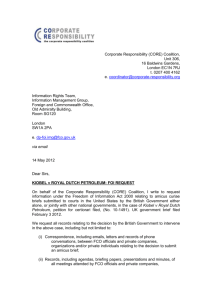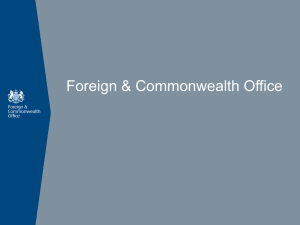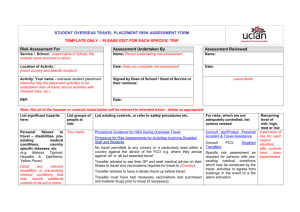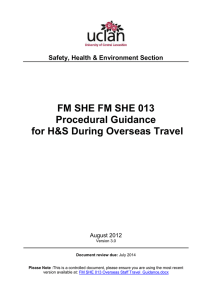Overseas Travel (Staff) Guidance
advertisement
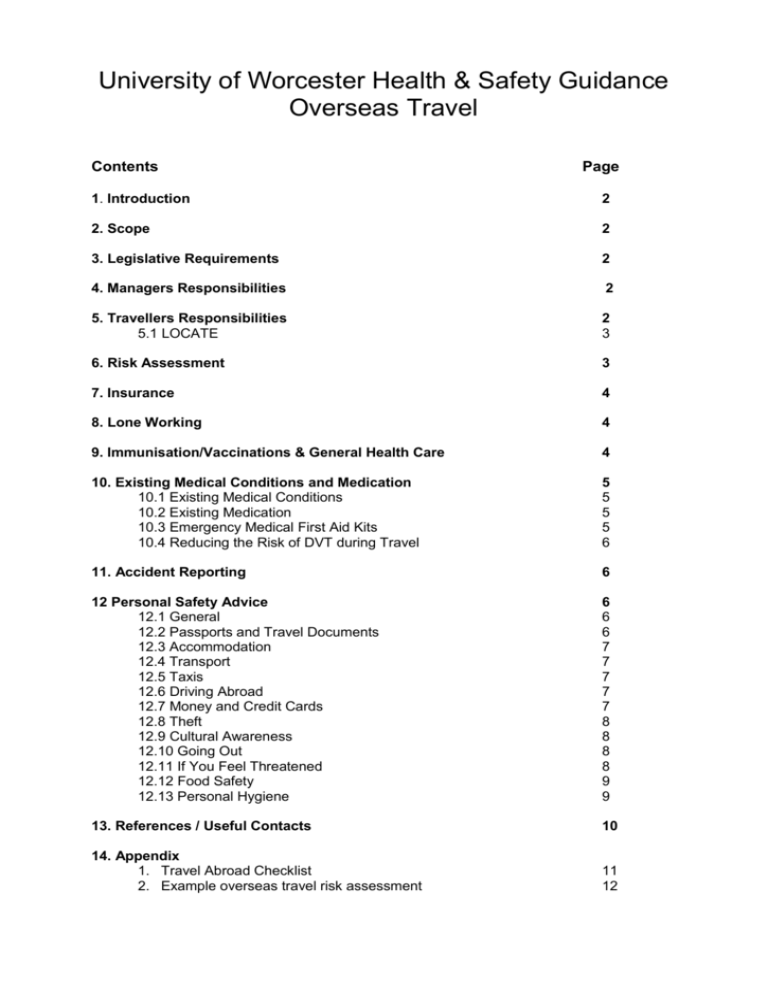
University of Worcester Health & Safety Guidance Overseas Travel Contents Page 1. Introduction 2 2. Scope 2 3. Legislative Requirements 2 4. Managers Responsibilities 2 5. Travellers Responsibilities 5.1 LOCATE 2 3 6. Risk Assessment 3 7. Insurance 4 8. Lone Working 4 9. Immunisation/Vaccinations & General Health Care 4 10. Existing Medical Conditions and Medication 10.1 Existing Medical Conditions 10.2 Existing Medication 10.3 Emergency Medical First Aid Kits 10.4 Reducing the Risk of DVT during Travel 5 5 5 5 6 11. Accident Reporting 6 12 Personal Safety Advice 12.1 General 12.2 Passports and Travel Documents 12.3 Accommodation 12.4 Transport 12.5 Taxis 12.6 Driving Abroad 12.7 Money and Credit Cards 12.8 Theft 12.9 Cultural Awareness 12.10 Going Out 12.11 If You Feel Threatened 12.12 Food Safety 12.13 Personal Hygiene 6 6 6 7 7 7 7 7 8 8 8 8 9 9 13. References / Useful Contacts 10 14. Appendix 1. Travel Abroad Checklist 2. Example overseas travel risk assessment 11 12 Health & Safety Guidance Overseas Travel 1. Introduction Overseas travel requires additional advance planning, care and common sense. It should be noted that travel abroad may expose staff to a number of health and safety hazards arising specifically from the travel itself and/or the conditions within the country being visited. These may not be necessarily directly work-related. 2. Scope The following document sets out University procedural guidance for the management of health and safety during overseas staff travel. It is intended to assist you in complying with relevant University procedures, the law and offers practical advice to help ensure your health, safety and welfare. It is applicable to all overseas travel undertaken by staff on University business, research etc. 3. Legislative Requirements The University has a statutory duty of care to protect, so far as reasonably practicable, the health, safety and welfare of its employees whilst travelling on University business. To fulfil this requirements all overseas travel and its associated work activity must covered by a suitable and sufficient risk assessment and appropriate control measures adopted. 4. Managers Responsibilities Managers must ensure that all staff travel and any associated work activity is risk assessed in advance of travel commencing and approved by them or their appointed nominee.. Managers should ensure that staff with a pre-existing medical condition or disability that could be potentially worsened by the proposed overseas travel/activity declares this and it is actively considered as part of the risk assessment process and suitable controls identified. 5. Travellers Responsibilities If you are intending to travel overseas on University business then this document applies to you. The Overseas Travel Checklist in Appendix 1 will assist you in planning the health and safety arrangements associated with your travel. All travellers are responsible for the following: 1. Ensuring a risk assessment is completed and submitted to your line manager to be approved by them or their appointed nominee; 2. Where relevant seeking confirmation from your GP that you are fit to travel particularly for ‘long-haul’ flights, The University’s Occupational Health provider can also provide medical examinations if required. 3. Declaring any relevant pre-existing medical condition or disability that could be potentially worsened by the proposed overseas travel/activity; 4. Ensuring that you have had the necessary vaccinations as advised by your GP / Occupational Health; 5. Checking the country specific safety advice on the UK’s Foreign & Commonwealth Office (FCO) website and complying with its requirements; 2 6. Checking Red24 (password 7797) which give country-specific travel security and health advice, plus the capabilities overseas from our insurers. 7. Providing your Institute/Department office with a travel itinerary covering issues such as flight numbers, departure times, accommodation address, telephone number, schedule of planned meetings, events etc and any other relevant contact details; 8. Registering with the FCO’s LOCATE scheme. 5.1 LOCATE If you are a planning to travel abroad, the FCO advise all British nationals even for short trips to register with their LOCATE scheme. The information you provide can then be used by the FCO / local UK embassy in the country you are visiting to alert you of any relevant travel concerns as well as contact you in the event of an emergency. The embassy and their crisis staff can then give you better assistance should a problem arise. If you are already registered with LOCATE and intend another trip, you can simply, login and update your LOCATE account and they will let the relevant British embassy know. 6. Risk Assessment All overseas work related travel and its associated work activity must be risk assessed in advance of travel commencing and be approved by the relevant line manager. Fundamental to risk assessing overseas travel is consulting the country specific safety advice given on the FCO’s travelling and living abroad website. Additional practical advice on travel to a specific country can also often be gained by talking to other staff who have experience of the particular country. Such advice must be incorporated into the risk assessment where relevant. Particular attention should be paid to countries or specific areas where the FCO advise against ‘all’ or ‘all but essential travel’. Please Note: No member of staff or student is permitted to travel to any country or area where the FCO advise against ‘all’ or ‘all but essential travel’. The FCO define ‘essential travel’ as consular work, emergency humanitarian aid, etc and not business, personal travel, etc. Additionally no member of staff or student should be expected to travel to a country or to a specific area where there are legitimate concerns about personal health or safety expressed by the FCO, e.g. due to a high risk of sectarian violence, terrorism, etc. Where risk assessments are completed several weeks before travel is to commence, they must be reviewed against the latest travel safety advice from the FCO to ensure the risk assessment is still current and the safety advice still relevant. The University also has a duty in relation to the proposed travel to, ‘so far as reasonably practicable’, make an assessment of a member of staff’s ‘fitness for travel’ prior to travel commencing. This is of particular importance as overseas travel may potentially impose additional health related risks. Staff with a pre-existing medical condition or disability that could be potentially worsened by the proposed overseas travel/activity should declare this to their line-manager, so it can be considered as part of the risk assessment process and suitable controls to protect the traveller identified. In such circumstances managers may wish to seek advice from the Health & Safety Office (ext: 5176) and/or the University’s Occupational Health Service (01905 356000). 3 Please note: Insurance cover is excluded whilst travelling against medical advice or for the purpose of obtaining treatment or medical advice. Example issues which may require consideration during the risk assessment process include: specific safety advice given by the FCO; mode of transport - both to, from and within the country and location being visited; staff ‘fitness’ to undertake the proposed travel / work activity; suitability / location of accommodation; specific health related travel issues e.g. jet lag, Deep Vein Thrombosis (DVT), manual handling, etc and diseases spread by animals, insects and personal contact essential and advised immunisation/vaccinations required; personal safety e.g. accidents, crime, political instability, local customs and laws; country specific legislation and/or customs; climate/season e.g. hot/cold/humid extremes, some diseases are also weather/season dependant; planned work activities – conference, data gathering, etc and leisure time activities; location being visited e.g. urban and rural travel may pose different risks; lone working issues; duration of trip - short trips may be of lower risk; health advice - including food/water hygiene, travellers diarrhoea and risks from local food and its preparation/handling, contaminated water, soil and airborne organisms; emergency and contingency arrangements including medical and travel insurance (including repatriation). An example risk assessment for overseas travel can be found in Appendix 2. 7. Insurance The University holds insurance for standard work-related overseas travel activities carried out by its employees. Travellers must ensure they are fully conversant with the requirements and arrangements of the policy. All insurance related enquires should be directed to the Finance Department 8. Lone Working It is recognised that in some situations it is not reasonably practicable to avoid lone working whilst abroad. Particular care should therefore be taken to establish safe procedures with respect to the working environment. 9. Immunisation/Vaccination and General Health Advice All staff intending to travel overseas are advised to have a medical and dental check-up before travelling. Where necessary, advice on the need for immunisation and other health related issues must be sought in advance of travel commencing. The University’s Occupational Health service may be contacted on 01905 356000. They can offer advice and provide a vaccination programme for staff. Additionally the NHS through its Fitfortravel Website issues guidance on the immunisation requirements for various countries. You should be aware that certain vaccinations are mandatory for entry into some countries and ensure you keep a record of all mandatory vaccinations when travelling. 4 The NHS also provides advice and guidance on the level of health care you are entitled to overseas on its Health Care Abroad website. 10. Existing Medical Conditions and Medication 10.1 Existing Medical Conditions If you have any medical needs, your chosen airline may ask you to complete an Incapacitated Passengers Handling Advice (INCAD) form and/or a Medical Information Form (MEDIF). These are standard forms used by many airlines to help them organise any assistance or equipment you may need during your journey and to decide whether you are fit to fly. You can fill in the INCAD form yourself, but the MEDIF form must be completed by your doctor. Most travellers do not have to fill in the MEDIF form, or apply for medical clearance to fly, including people who have stable, long-term disabilities and medical conditions. You should contact the airline and discuss your condition with them, even if your doctor says you are fit to fly, as different airlines have different policies about carrying disabled passengers and people with medical conditions. The airline will be able to give you any forms they require you to complete. Further information is available from DirectGov - Airport and airline services for disabled travellers website. 10.2 Existing Medication Ensure you keep a written record on your person of any medical condition affecting you and the proper names – not just the trade names – of any medication you are taking. If you need prescribed medication for a health condition, talk to your doctor or practice nurse about your travel plans as they can tell you if you need to make any special arrangements. You may need to check the rules for all the countries you’re going to, including countries that you are just passing through. Different countries have different rules and regulations about: The types of medicine they allow to be taken into the country, and The maximum quantity you can take in. Some medicines available over the counter in the UK may be controlled in other countries and vice versa. Countries such as India, Pakistan, Japan and Turkey have lists of medicines that they will not allow into the country. Contact the embassy of the country you’re visiting for advice. The UK FCO website has a full list of foreign embassies in the UK. Further information and advice on taking medicines overseas can be found on the NHS website. 10.3 Emergency Medical First Aid Kits The University’s Health & Safety office can provide emergency medical first aid kits for travellers to higher risk countries / environments. Please contact the Health & Safety Coordinator (ext: 5176) for further details. 5 10.4 Reducing the Risk of Deep Vein Thrombosis (DVT) During Travel Prolonged immobility on long journeys, whether by plane, train or car, can lead to 'Deep Vein Thrombosis' (DVT) - a blood clot in the leg. To help reduce the risk, move your feet around, or get up and walk around regularly if you can and avoid dehydration by taking regular nonalcoholic drinks. Further information can be found in the University Procedural Guidance on Travel Related Deep Vein Thrombosis (DVT). 11. Accident Reporting All accidents/incidents of ANY kind while you are at work (including travelling as part of your work activity) MUST be reported on the University’s Accident Report Form. Forms can be downloaded from the Health & Safety webpage. Serious incidents must also be reported immediately to the University by telephone on (+44) 01905 855000. Additionally in the event of a serious injury or fatality the following University services must also notified: Personnel (+44) (01905 85) 5173 Out of Hours: Security hold a list of senior staff who can be contacted: (+44) (01905 85) 2189 12. General Personal Safety advice from the FCO for travellers abroad 12.1 General Keep abreast of the local and regional political scene in the media; Try to avoid potentially risky situations - think about what you are doing at all times and trust your instincts. It is easy to let your guard slip when you are away from home. Try to be as careful as you would be at home; Act confidently. Plan your itinerary so you know where you are going and what you are doing. Try to avoid looking lost or confused, avoid unlit streets at night and vary your route if making regular journeys; Report daily to a University contact; Be wary of new ‘friends’. Don’t tell strangers where you are staying or give out too many details about your travel plans; Mobile phones should be checked with the network provider for compatible operation before departure and ‘roaming’ enabled if available. Programme in useful numbers such as the local police, the British Embassy or Consulate and a trustworthy taxi company; Always carry with you the telephone numbers of the nearest British Embassy or consulate for the country/area to be visited (listed on the FCO web site). 12.2 Passports and Travel Documents Ensure you have a valid passport (minimum of six months at return date) and any necessary visas; Write the full details of your next of kin in your passport; Keep your passport in the hotel safe and carry a photocopy with you at all times. Additionally leave a copy at home and/or with your school/service office; Take another form of ID with you (preferably with a photograph); Always keep your travel tickets and other important documents in a safe place; Note: some countries require you to carry a valid form of ID with you at all times. 6 12.3 Accommodation Avoid ground floor rooms; Never leave your key where someone can note your room number; Do not leave your window open, especially if your room is on the ground floor or has a balcony; Remember to lock your room door even when you are inside the room; Never open your room door to anyone without checking with reception first that they are genuine; Recommend that if you intend to take any electrical appliances with you, that you obtain a suitable adaptor for the local voltage to ensure that they can be used safely. 12.4 Transport Where possible, for higher-risk countries or where recommended by the FCO, organise a named contact to meet you at the airport; 12.5 Taxis Keep the phone number of a trustworthy taxi company with you at all times. (Hotels and tour companies can normally give you details of such); If possible book taxis through the hotel, the drivers name and approximate fare should be verified beforehand; Always keep some money for phone calls and a taxi journey home from your destination separate from the spending money you take out with you; If you are in a vehicle and you feel threatened, firmly ask the driver to stop and try to get out in a busy public place. If the driver refuses to stop, try alerting other drivers by shouting or waving out of the window. 12.6 Driving Abroad Never drink and drive; Ensure you understand the driving laws, licence requirements and driving conditions specific to the country you are visiting; Make sure your UK driving licence is current and valid. Some countries require you to hold an International Driving Permit (IDP) with your UK licence; If you are staying for an extended period of time check what the driving licence requirements are; Be aware that in many countries there are on-the-spot fines for traffic offences exceptions are not made for foreigners. 12.7 Money & Credit Cards Use a money belt or secure inside pocket. Only carry the minimum amount of cash that you need for the day; Never leave large amounts of cash in your room (unless in a room safe), always use the main hotel safe / safety deposit box where possible; Check local restriction on the use of credit cards. Don't carry all of them with you – leave at least one in the hotel safe. If you lose or have your credit card stolen cancel it immediately by phoning the relevant 24-hour emergency number; Change money in banks or legal foreign exchange dealers. It may be illegal to change money with unauthorised persons and you run the risk of receiving fake currency and arrest; Keep all exchange receipts, as you may have to prove you obtained your local currency legally; 7 Consider carrying ‘universal’ currency such as US dollars up to the value of approximately £50 for emergencies. 12.8 Theft Leave your valuables and spare cash in the hotel safe or other secure place; Consider carrying two wallets, one should be prepared as a ‘dummy’ to be thrown down if threatened. It should contain around US $50, some local currency, a few old receipts, expired credit cards and a few UK notes; Never resist violent theft; If your money, passport or anything else is stolen report it immediately to the local police; Obtain a police statement about the loss: you will need to claim on the University’s insurance policy; Phone your bank at home to transfer money or to cancel your credit card using the relevant 24-hour emergency number; 12.9 Cultural Awareness Get a good guidebook, this will tell you about the country you are visiting and help inform you about local laws, customs and culture; Take a phrase book and try speaking the local language; Respect local customs and dress codes, particularly if visiting religious sites, markets and rural communities - think about what you wear and how you fit in; Particular care should be taken not to offend Islamic codes of dress and behaviour with regard to sexual relations, alcohol and drugs; Be discreet about your views on cultural differences; Always ask an individual’s permission before you take a photograph and respect their reply. In some cultures you should not attempt to photograph women; Do not haggle too aggressively. In most countries where haggling is the norm, it is done with good humour and not for too long. Although prices are usually inflated for tourists, it’s also important to remember that the discount you are haggling over could be a few pence for you but a significant means of income for a seller; It is always best to err on the side of caution. Behaviour that would be regarded as innocuous elsewhere can lead to serious trouble. 12.10 Going out Always tell someone where you are going and when you expect to return; Be aware of “no-go” areas and avoid them; Make sure you know the address and phone number of where you are staying and how to get back; Stay aware of what is going on around you and keep away from situations where you do not feel comfortable; Be aware that alcohol can lead to you being less alert, less in control and less aware of your environment; If you are going to drink alcohol, know your limit. Remember that drinks served in bars overseas are often stronger than those in the UK; Be cautious of people who ignore your personal space, do not listen to you, and make you feel guilty if you resist their advances or appear to be very drunk. 12.11 If you feel threatened Stay calm, and try to be firm and direct; 8 Remember that you always have the right to say ‘no’ at any point. Never feel that you have to go further than you feel comfortable with; If you feel pressured, get out of the situation. Never assume that it won’t happen to you; Get away from the person you are with and go to a safe place; If you feel uncomfortable or in danger, do not be afraid to draw attention to yourself. Shout, make a fuss and make people aware that you feel threatened; 12.12 Food Safety Wherever you travel overseas be careful of what you eat and drink, food and water may be contaminated in a variety of ways. Traveller’s diarrhoea, as well as diseases such as cholera, typhoid and hepatitis A can all be caught from contaminated food and water, but they can also largely be avoided by simple precautions. 12.13 Personal Hygiene Always wash your hands after going to the lavatory, before handling food and before eating; If you have any doubts about the water available for drinking, washing food or cleaning teeth, boil it, sterilise it with disinfectant tablets or use bottled water - preferably carbonated with gas - in sealed containers; Avoid ice unless you are sure it is made from treated and chlorinated water. This includes ice used to keep food cool as well as ice in drinks; It is usually safe to drink hot tea or coffee, wine, beer, carbonated water and soft drinks, and packaged or bottled fruit juices; Eat freshly cooked food which is thoroughly cooked and still piping hot; Avoid food which has been kept “warm”; Avoid uncooked food, unless you can peel or shell it yourself; Avoid food likely to have been exposed to flies; Avoid ice cream from unreliable sources, such as kiosks or itinerant traders; Avoid - or boil - unpasteurised milk; Fish and shellfish can be suspect in some countries, uncooked shellfish, such as oysters, are a particular hazard. Health & Safety Office Ext: 5176 March 2011 9 13. References/ Useful Contacts Department of Health. Health Advice for Travellers: http://www.dh.gov.uk/PolicyAndGuidance/HealthAdviceForTravellers/fs/en Foreign and Commonwealth Travel Site: http://www.fco.gov.uk/en/travel-and-living-abroad/ FCO LOCATE Scheme: https://www.locate.fco.gov.uk/locateportal/ World Health Organisation: http://www.who.int/en/ Health & Safety Executive (HSE): http://www.hse.gov.uk/ TravelHealth Advice (detailed advice on various travel related issues): http://www.travelhealth.co.uk/advice/index.html NHS Fit to Travel: http://www.fitfortravel.nhs.uk/home.aspx NHS Taking medicines overseas: http://www.nhs.uk/chq/Pages/1074.aspx NHS Health Care Abroad http://www.nhs.uk/nhsengland/Healthcareabroad/pages/Healthcareabroad.aspx DirectGov - Airport and airline services for disabled travellers http://www.direct.gov.uk/en/DisabledPeople/TravelHolidaysAndBreaks/GettingThere/DG_401 7242 10 Appendix 1. Overseas Travel Checklist 1 2 Pre-Planning Issues Yes a) Have you checked the FCO website for relevant travel advice on the country you are visiting? b) Are there any travel restrictions to the country you are visiting? C) Do the FCO identify any major concerns with travel to this country? a) Any necessary/advised vaccinations you may require? b) Personal health needs, if applicable, e.g. climatic extremes? allergies? mobility issues? medications? special dietary requirements? long haul flights? contact with venomous, poisoness or aggressive animal or any plant that may pose health risk? a) Have you declared any relevant pre-existing medical condition or disability? b) Has a travel risk assessment been completed? c) If applicable, have lone worker issues been adequately addressed? Has information been obtained on what you can / cannot take on flights and import into the country of destination? If driving abroad, have you checked your driving license is valid in the country to be visited? Are you aware of driving patterns in that country? Do you know whom to contact to receive medical, legal, consular, local, and assistance while abroad? Have you asked your hosts for local advice on personal safety e.g. going out after dark, using public transport, areas to avoid etc? a) Do you have a copy of the University’s travel insurance and medical emergency numbers? b) Do you understand what the insurance covers? Has an up-to-date itinerary of your trip been lodged with your school/service? Do you know who to contact in an emergency? Have next of kin and GP contact details been lodged with your school/service? Have you sought advice Occupational Health on: from your GP 5 6 7 8 9 10 11 12 Comments or 4 No 11 Risk Assessment – Overseas Travel On completion, please ensure that the hard copy Risk Assessment is signed by Head of Department. Please email a soft copy to (University Finance Office) and (International Office). Contact (International Office, ext.) for further advice or assistance in completing the assessment. Travel is not permitted to areas where the Foreign and Commonwealth Office advise against travel and/or Red24 classify as ‘Extreme risk’ If you choose to ignore the current recommended vaccine and travel health advice for the countries which you are visiting, you will be travelling at your own risk Name & Department Signature of traveller Country & Cities to be visited Date Signature of Head of Department Date of Departure/Return Purpose of Visit Name of Head of Department Date Have you travelled to this country before? Yes - No (delete as applicable) Please specify if you have extensive knowledge of the country you are visiting (gained from residence, citizenship or work experience there) Yes - No (delete as applicable) 12 What are the current risks identified by FCO for the country being visited? Please copy and paste the bullet-pointed travel summary from the FCO webpage for the country being visited: Go to www.fco.gov.uk Click on ‘Travel and living abroad’ Select the country you are visiting You are strongly advised to register with the FCO LOCATE service 13 What is the risk rating determined by Red24? Please copy and paste the Overall risk rating and Risk rating breakdown table from the Red24 website – Go to https://www.red24.com/affiliate/aonprotect/index.php Enter password – 7797 Click on 'Travel assistance website' on the right then select the country you are visiting You are strongly advised to register on the Red24 home page for ‘SMS travel alerts’ to your mobile 14 Category Associated problems Crime Street crime, local scams, theft, hotel room security Terrorism Bombings, security alerts, terror attacks Conflict Political Localised tensions or fighting that could result in outbreak of hostilities Civil unrest , strikes, riots, political demonstrations, upcoming elections or significant events Kidnap Abduction/kidnapping Infrastructure Transportation Medical capabilities Contaminated food Contaminated water & drinking water Utilities Natural Risks Climate conditions Natural disasters Probability: Low, Medium, High, Extreme? Measures taken to reduce risk – www.fco.gov.uk and ) Airport collection, local driving standards, hazardous terrain, roadworthiness, safety belts Hospital proximity and standards, methods of payment for treatment, access to local doctor Allergies, Hepatitis A, dysentery/diarrhoea, severe stomach upset Dysentery/diarrhoea, legionella, leptospirosis, polio, cholera, typhoid Compatibility of equipment, voltage, safety standards, power cuts Extreme heat or cold, high humidity, monsoon/storms, altitude Typhoon, tornado, tsunami, avalanche, earthquake, flood 15 Cultural Risks Hazardous activities Contact with insects Bites/stings, Lyme’s disease, malaria, yellow fever Contact with animals Allergies, asthma, bird flu, bites, dermatitis, rabies, stings Local Culture Customs, dress, religion, behaviour Legal differences Local codes/guidance, local statute Activities Skiing, white water rafting, bungee jumping, diving etc. Hazardous substances/chemicals Field work/research Available antidotes, transport requirements, spillage Permits to work, safe systems, tides/water conditions, medical back-up, remoteness of work site Other Your Department Contact Embassy in-country Emergency Numbers Please enter the number of your emergency contact person in your department here: Please enter the number of the local Embassy in the country you are visiting (see country page on www.fco.gov.uk) (44) 20 7173 7797 Insurers Injury & Travel (24/7) Name: Tel: Tel: Address: (44) 20 3291 2424 Red Care Life Threatening (24/7) (Please also keep the University informed) 16 ITINERARY Mobile number Phone being taken on trip Local contact Name, organisation and telephone number Travel bookings Please state whether booked online (and name website), through local contacts or through travel agent (please name) Date Flight /Travel details * Flight No: From/To: Departure time: Arrival time: Flight No: From/To: Departure time: Arrival time: Flight No: From/To: Departure time: Arrival time: Flight No: From/To: Departure time: Arrival time: Flight No: From/To: Departure time: Arrival time: Hotel/Accommodation details Name: Address: Tel: Name: Address: Tel: Name: Address: Tel: Name: Address: Tel: Name: Address: Tel: *If travelling by ferry/ train etc please complete as for flight but enter operating company eg Eurostar, Brittany Ferries. 17
